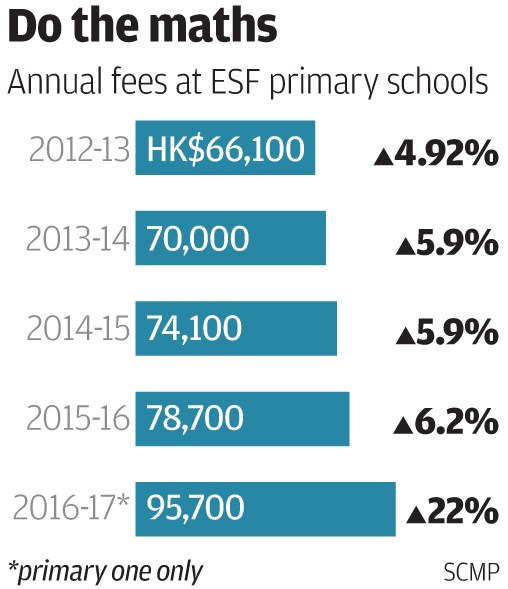
ESF fees soar 22 per cent for new pupils as Hong Kong government subsidy is phased out
Increase will deprive middle class of affordable schooling, says lawmaker
Parents whose children enter Year One at the English Schools Foundation next year will have to pay 22 per cent more as the government starts to phase out its annual HK$283 million subsidy.
The current annual fee of HK$78,700 will soar to HK$95,700, an increase that lawmaker Dr Kenneth Chan Ka-lok said would deprive middle-class families of affordable education.
The ESF would seek other ways to generate income such as more fund-raising, its chief executive officer Belinda Greer said yesterday, while announcing a five-year financial strategy after the 13-year phasing out of the subvention starts next year.
With the subvention being phased out, that put us in a very difficult position
There may also be additional increases to cover rising costs due to inflation, the foundation said on its website.
Parents with children currently at ESF schools were hit with fee increases of up to 8.8 per cent for 2015-16.
"We are very mindful of the impact of fee increases on families," said Greer. "With the government subvention being phased out, that put us in a very difficult position."
Greer said the foundation aimed at imposing minimum fee rises while maintaining its ability to attract "top-quality" teachers to guarantee its standards.
She said the foundation would put more effort into fund-raising to generate revenue on top of funds raised from nomination rights and a non-refundable capital levy of up to HK$38,000.

Critics accuse the ESF of spending too much on hiring executives and other non-teaching staff, but Greer said it would not necessarily save money if all these executives were fired. It would just mean that each of its 21 schools would need to set up new financial, human resources and communication departments, she said.
Chan, whose three daughters study at ESF schools, said: "It's bad news for these families and bad news for Hong Kong."
He said the ESF being "privatised" would deter many Chinese professionals from returning to the city from overseas. He said the government was undermining its own policy of attracting "overseas returnees" by phasing out the subvention.
The ESF was created in 1967 to serve the children of colonial civil servants, but it has become an increasingly popular choice for local parents seeking an international education.

